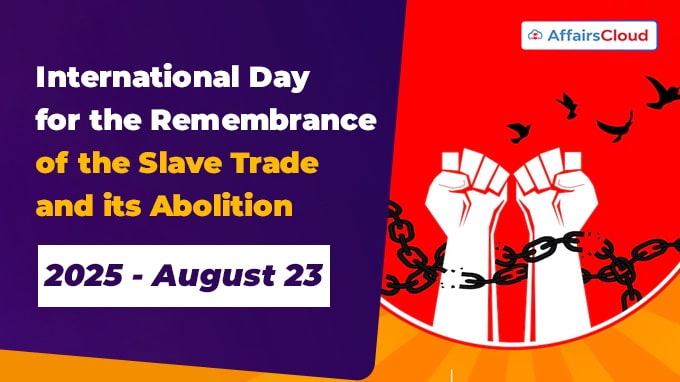 The United Nations (UN) International Day for the Remembrance of the Slave Trade and its Abolition is observed every year across the world on 23rd August to honour the memory of all people who suffered under the transatlantic slave trade during the colonial era.
The United Nations (UN) International Day for the Remembrance of the Slave Trade and its Abolition is observed every year across the world on 23rd August to honour the memory of all people who suffered under the transatlantic slave trade during the colonial era.
- The annual observance is led by the United Nations Educational, Scientific and Cultural Organisation (UNESCO).
Exam Hints:
- What? International Day for the Remembrance of the Slave Trade and its Abolition 2025
- When? August 22
- Aim: Honouring people who suffered under the transatlantic slave trade during the colonial era.
- Proclamation: UNESCO adopted Resolution 29 C/40 at its 29th General Conference session
- First Observance: 23 August 1998 – in Haiti
Background:
Proclamation: The 29th session of the UNESCO General Conference in 1997 adopted Resolution 29 C/40, declaring 23 August as the International Day for the Remembrance of the Slave Trade and its Abolition.
Promotion: On 29 July 1998, UNESCO’s Director-General issued Circular CL/3494, inviting Ministers of Culture of all member states to promote the observance of the Day.
Observance: The International Day for the Remembrance of the Slave Trade and its Abolition was first observed in Haiti on 23 August 1998.
- The following year, on 23 August 1999, the Day was observed at Gorée Island in Senegal.
Why 23 August?
On the night of 23 August 1791, self-liberated enslaved people in Saint Domingue (present-day Haiti and Dominican Republic) launched a revolt against French colonial rule.
- This uprising was a turning point that played a crucial role in the abolition of the transatlantic slave trade.
Significance:
Awareness on Abolition: The Day spreads awareness about the abolition of slave trade and related practices, while affirming the equal and unconditional dignity of every individual.
Collective Reflection: It provides an opportunity to collectively recognise and reflect on the historical causes, methods, and consequences of slavery.
Slave Trading:
Definition: The transatlantic slave trade, or Atlantic slave trade, began in the mid-17th century, becoming the largest long-distance forced migration in recorded history.
Scope: From the 16th to 19th centuries (until the 1860s), millions of Africans were forcibly transported to the Americas by European traders.
Initiators: The Portuguese and Spanish initiated the slave trade, particularly after establishing sugar plantations in the Americas.
Middle Passage: Refers to the brutal Atlantic voyage endured by enslaved Africans as part of the trade.
Abolition: On 25 March 1807, the British Parliament passed the Abolition of the Slave Trade Act, banning the trading of enslaved people in the British Empire.
Haitian Revolution:
Overview (1791–1804): A series of conflicts involving enslaved Haitians, colonists, and colonial armies of Britain and France.
Beginning: The revolution started on the night of 22–23 August 1791, when enslaved people in northern Saint Domingue rose against French colonial rule.
Independence: After years of struggle, Haiti was declared an independent nation on 1 January 1804.
Significance: Haiti became the 2nd independent country in the Americas, following the United States of America’s independence in 1783.
Unique Achievement: The Haitian Revolution remains the only successful slave revolt in world history, leading to the establishment of Haiti as the first independent black state.
UNESCO Slave Route Project:
Launch: In 1994, UNESCO initiated the “Routes of Enslaved Peoples: Resistance, Liberty and Heritage” program (formerly Slave Route Project) at Ouidah, Benin, to advance knowledge on slavery and the slave trade.
International Scientific Committee (ISC): Consists of 20 members appointed by the Director-General of UNESCO, advising on programme implementation.
30th Anniversary: The year 2025 marked the 31th anniversary of the Routes of Enslaved Peoples program.
Global Commemoration: On 23 August, the National Maritime Museum, Greenwich, United Kingdom (UK) hosts International Slavery Remembrance Day events annually.
Related Observance
The UN International Day of Remembrance of the Victims of Slavery and the Transatlantic Slave Trade is observed annually on 25 March to honour victims of slavery.
- 2025 Theme: “Honoring Memories, Fostering Resilience”
About the United Nations Educational, Scientific and Cultural Organisation (UNESCO):
Director-General (DG)- Audrey Azoulay
Headquarters- Paris, France
Established – 1945




